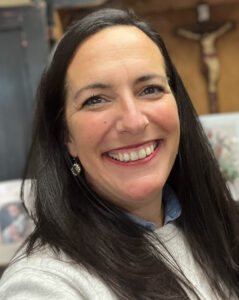By

“Just put socks on her; she’ll be fine.” That was my mother-in-law’s response when we told her our newborn daughter had been diagnosed “failure to thrive” and needed to be hospitalized. As a veteran special educator, I was overwhelmed with all the what-ifs that the unknown future held – and I was pretty sure that putting socks on a newborn in July was not going to magically make her seemingly broken body work correctly.
But was it broken? And what about fixing it?
Being the parent of a child with special needs opened the door of intimate exploration into my profession that I never knew possible. Personal soul searching and all the “why’s” suddenly had so much more relevance to me. Before answering those questions, I had to get to the root of it all: God. He created her. Everything He does has purpose and is perfect. Her body was not working properly and needed help; but was it really broken and needed to be fixed, corrected to work just like everyone else’s in a cookie-cutter like fashion because she broke the mold? Or did my perspective of what is normal, right and correct need to change?
I believe that God created our daughter for a very specific purpose, just as He does for each of us; and He created her the way He did to achieve such. In the early years of her life, when in prayer, I begged Him to give her life purpose and worth; for her to glorify Him and her life not be in vain. Because of that belief, I strive to see every individual, the person – not a disability, a syndrome or a piece of adaptive equipment – so that my perspective is not skewed. Armed with that knowledge, I challenge you to approach disability questions from non-disabled children in a person-first fashion to shape their perspective as they mature.
- Be honest and matter-of-fact, and address questions in a kid-friendly way. “I’m not sure why that person is using a walker; how great that he/she has such independence!”
- Some disabilities can be seen or heard, and others cannot. “That person is struggling right now; let’s quietly move on so the adult can help him/her clam down.”
- Don’t try to convince your child that someone with a disability is just like him/her. Instead, acknowledge the difference, but make it clear the difference doesn’t make them bad, sick or contagious.
- If you say someone’s disability is sad or awful, your child may pity the person – and that won’t be helpful, so avoid injecting your emotions into the conversation.
- There’s nothing wrong with disabled people. Your child may ask questions like, “What’s wrong with that girl?” Explain that a child may have trouble talking or difficulty walking, but that doesn’t mean there’s something wrong with them. Remember, they were purposefully made.
- Point out things a child with a disability has in common with your child. Say things like, “Sara is good at math, just like you are. And you both love to listen to the same kind of music.” Understanding how they’re the same can help your child relate better to people with disabilities, and it can help increase your child’s empathy.
- There’s a good chance you won’t have all the answers about someone’s disability. Researching a disability together can help you show your child how to educate himself on unfamiliar conditions. Look for kid-friendly websites that offer information about autism, Down syndrome, learning disabilities or others.
- Check out age-appropriate books about inclusion and/or disabilities from the local library.
- Your child may have some tough questions about someone’s disability. Don’t be afraid to say, “I don’t know” if you don’t have the answer. Or, try saying, “I’ll have to think about that and get back to you” if you need some time to gather your thoughts before giving an answer.
Looking back on my mother-in-law’s advice I realize it is the very best I could have gotten: take care of the person right here in front of you; worry about the syndrome later. Put on the socks.
Laurie Ziliak lives in Haubstadt with her husband, Jonathan, and their four children. They are active members of St James Parish, where Laurie serves on several committees and often leads the rosary. She recently opened a gift shop, Rooted in Him, where she offers religious items, gifts and seasonal fresh-cut flowers.
